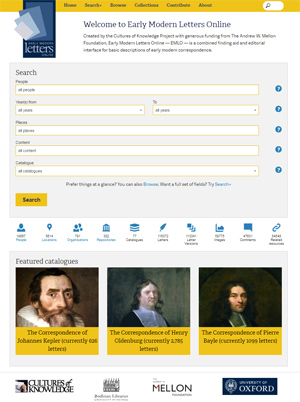When the nineteen-year-old Austrian-born Matthias Bernegger embarked upon his studies in Strasbourg, he developed a particular interest in astronomy and mathematics. Shortly thereafter, he entered into correspondence with two of the leading astronomers of the age: Johannes Kepler and Wilhelm Schickard. Both relationships were to prove enduring and they were developed and maintained for the rest of the older astronomers’ lives and may be charted from the calendar published this week in EMLO, which is based upon Bernegger’s letters that have been published in epistolaries.
Against a backdrop of war and ubiquitous plague, Bernegger played a significant role in the lives of a number of members of Kepler’s family. On 12 March 1630, Kepler’s daughter Susanna married Jacob Bartsch, a young mathematical scholar who worked for her father as an assistant. Kepler had decided that the wedding should take place in Strasbourg but was unable to make the journey from Żagań [Sagan] himself, partly because of the distance (according to Google maps, this is 717km.  walking pretty much as the crow flies) and his age (he was approaching sixty), and in part because his second wife, Susanna Reuttinger, was heavily pregnant (their youngest child, Anna Maria was born just one month later). Kepler wrote to ask Bernegger, who had helped introduce the couple, to deputize on his behalf, and Bernegger replied with accounts of the wedding. At this point, Kepler had only a few months left to live. Bernegger continued as professor and rector at Strasbourg for the final decade of his life, before dying there on 5 February 1640. Bartsch, the bridegroom at the Strasbourg wedding, edited and published his father-in-law’s Somnium, but is thought only to have lived for a further three years before succumbing to plague.
walking pretty much as the crow flies) and his age (he was approaching sixty), and in part because his second wife, Susanna Reuttinger, was heavily pregnant (their youngest child, Anna Maria was born just one month later). Kepler wrote to ask Bernegger, who had helped introduce the couple, to deputize on his behalf, and Bernegger replied with accounts of the wedding. At this point, Kepler had only a few months left to live. Bernegger continued as professor and rector at Strasbourg for the final decade of his life, before dying there on 5 February 1640. Bartsch, the bridegroom at the Strasbourg wedding, edited and published his father-in-law’s Somnium, but is thought only to have lived for a further three years before succumbing to plague.
Of course, the more connections that are made in EMLO, the more overlaps occur with the same letter appearing in more than one catalogue. I had a wonderful couple of weeks just before Christmas working with an extremely talented developer, Journi Tuominen, from Aalto University, to scope out and pilot a powerful tool that will search across a range of metadata fields in EMLO to suggest matches that, if confirmed, will allow links to be set in place to identify and tag contributions by multiple scholars as different interpretations of the same letter. Jouni will be back in Oxford next month, at work once again on this tool, so watch this space; the various levels on which connections in EMLO may be made are increasing apace.

 Of course eagle-eyed users will have spotted already significant new-year additions to existing catalogues in EMLO: as of this week, the calendar of
Of course eagle-eyed users will have spotted already significant new-year additions to existing catalogues in EMLO: as of this week, the calendar of